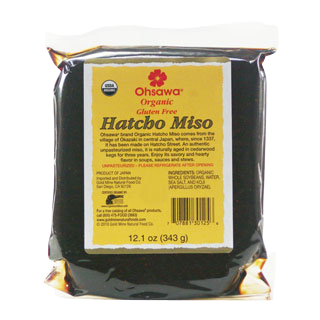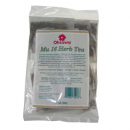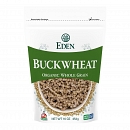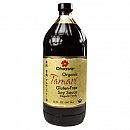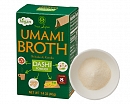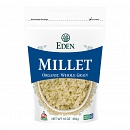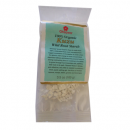
Hatcho Miso Ohsawa® Organic 12 oz
- $10.00
- In stock
- Packaging type:
-
Quantity
Organic, Macrobiotic, Vegan, Raw, Kosher, Gluten-Free
Country of Origin: Japan
Made solely from whole organic soybeans, water, sea salt, and koji. Hatcho miso comes from the village of Okazaki in central Japan’s Aichi Province, where, since 1337, it has been made by Maruya Hatcho Miso Company, located on Hatcho Street.
An authentic unpasteurized miso, it is naturally aged in cedarwood casks for three years. Enjoy its savory and hearty taste.
The history of our hatcho miso maker, Maruya Hatcho Miso dates back to 1337, when its founder, Yaejiemon Ohta, first started his own miso making business in the area of Japan known as "Okazaki" today. By the middle of the 16th century, his miso became known as "hatcho miso," whose name derived from its proximity ("ha" meaning 8, and "cho" meaning one city block) to the Okazaki Castle. The Okazaki Castle is the birth place of Ieyasu Tokugawa who was the first shogun of the Tokugawa Shogunate. During the Warring States period (aka the 'Sengoku Period'), hatcho miso was a prized ration of food for his samurai warriors.
Maruya Hatcho adheres to the ancient craft of traditional style of making miso that was developed through the course of the last several hundreds of years. For instance, the fermentation kegs are still made with Japanese cedar and placed directly on the surface of earth. Although it sounds almost mythical, it is said that hatcho miso gets good vibration of energy directly from earth during the fermentation period of passing at least two summers and two winters. There are also a few more traditional practices such as their method of digging aged miso out of the keg physically by hands. Part of an apprentice's daily routine is to dig miso out of the keg. This 'miso digging' process to empty the keg takes about a week to complete. Although the digging is a truly back-breaking work, it is said doing this the good old-fashioned way enhances good harmony of the energy that's been accumulated over the long fermenting period.
On the other hand, a wave of modernization is present in today's manufacturing of hatcho miso. Production efficiency and quality have been upgraded by recent implemention of plant automation and computerization (along with the quality control documentations complied with ISO 9001 standards). Maruya Hatcho successfully positions themselves between modernism and tradition which shows traditional miso making can coexist with modern approaches to manufacturing excellence.
And now, news about the latest miso development: Our organic hatcho miso is now available as "gluten-free." It took a series of experimentations that lasted several years. Maruya Hatcho finally succeeded in making hatcho miso without the traditional roasted barley flour that has been used for generations. This breakthrough required steering somewhat away from tradition in order to cope with the change of the time and demand. Certainly, one thing is for sure; hatcho miso keeps evolving after more than 670 years after its birth.
Perhaps the most puzzling and mythical feature of hatcho miso making is the involvement of the stone pyramid. A pyramid's design, with the majority of the weight closer to the bottom (of the ground) and less material higher pushing down, allowed early civilizations to create stable monument structures. Believe it or not, this ancient technique for the distribution of weight is utilized in hatcho miso production, as piling up stone pyramid on the top of the keg, to enhance a balanced distribution of salted water and steamed soybean in the keg. In addition, it's believed, the 'supernatural' pyramid power may be involved in the hatcho miso making.
Ingredients: certified organic whole soybeans, water, natural lake salt and koji
Nutrition facts:
Serving size 1tsp. (17g)
Calories 40
Calories from fat 15
Total fat 1.5g (2%)
Sodium 680mg (28%)
Total carbohydrates 4g (2%)
Dietary fiber 2.2g
Sugar 0g
Protein 3g
*Percent daily values based on a 2,000 calorie diet.














